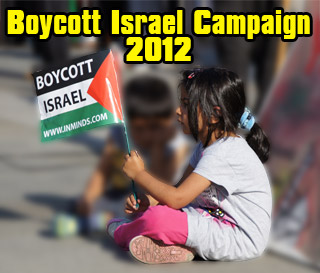
 Innovative Minds © 2014. All Rights Reserved. www.inminds.co.uk | |||||
|
[Other] Women United in the Intifadainminds Women United in the Intifada is the third of a series of events initiated by Sons of Malcolm and friends which salutes the 10th anniversary of the eruption of the Second/Al-Aqsa Intifada in September 2000. 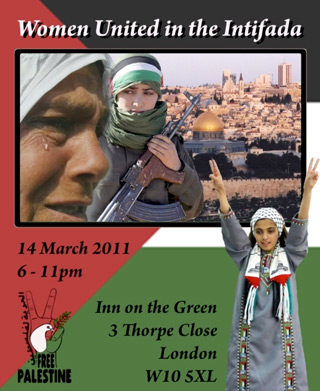 The first in this series was on October 2nd with 300 people in attendance discussing Solidarity and Internationalism with the strategic approach of 'we will not liberate Palestine, Palestine is liberating us'. The second in the series was on November 6 at the Venezuelan Embassy entitled 'Outbreak of the Intifada: Turning back the Empire', which explored how the Intifada was the first big offensive which has led to the on-going demise of empire. This meeting received a lot of opposition from the zionists in their press as this event represented the growing unity of anti-imperialist and Third Worldist forces in the midst of the empire: London. Despite the protests of the zionists, the meeting was a great success with 100 people in attendance. This third event, which is jointly organised by a network of media and cultural activists (including Team Fight The Oppression (Team FTO), Lizzie's Liberation, Straight Talk, and other individuals and groups) entitled Women United in the Intifada, seeks to learn, explore and give full respect to all the female strugglers and martyrs in the Intifada. The main approach to this question is stressing that unity is paramount between those from different political factions, traditions and outlooks; that the Intifada showed Palestinian women and girls united, and that unity was one of the primary strengths of the Intifada. On Monday 14th March 2011, around a 100 people packed in to the venue at Ladbroke Grove in West London to hear some amazing speakers.
This was followed by over an hour of lively discussion and questions and answers. Full video is provided below. 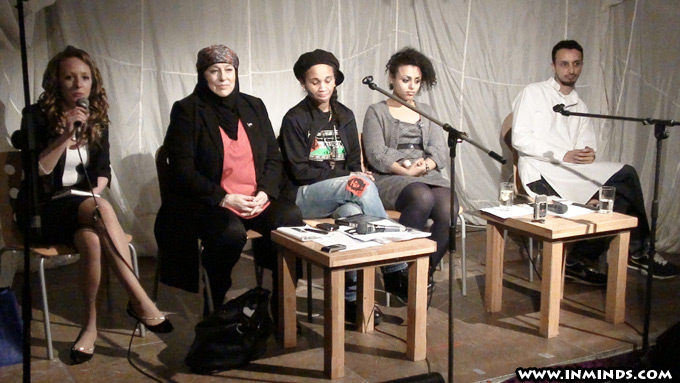 Lizzie Cocker, Yvonne Ridley, Isis Aamlak, Alaa Kassim, and Sukant Chandan (left to right) Lizzie Cocker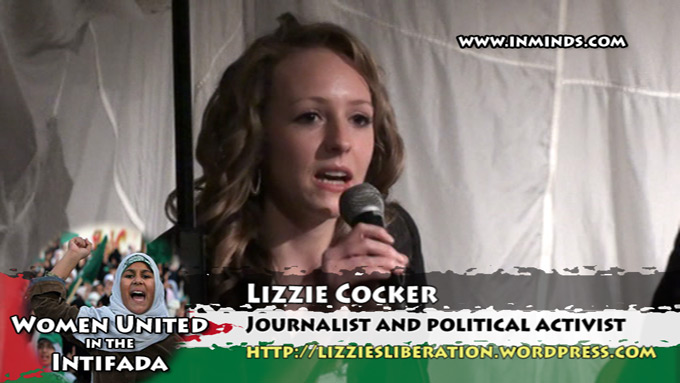 Lizzie Cocker Lizzie Cocker, an accomplished journalist (Morning Star) and political activist, chaired the proceedings. In her insightful opening speech she explained how islamophobia is used as tool to divide anti-imperialist movements in the west from those in the Muslim world: "And women are often used by a white male dominated media industry and western political establishment as a tool of division which they have successfully done in the sense that those interested in the struggles of people in the Muslim world against imperialism often find their commitment to certain forces directly fighting empire challenged by the portrayal of women. This is mostly true today in relation to Islamist movements, where a culture of Islamophobia and eurocentricism in the west has harboured a lazy attitude towards understanding the role of Islam in social and political life and thus the life of women." 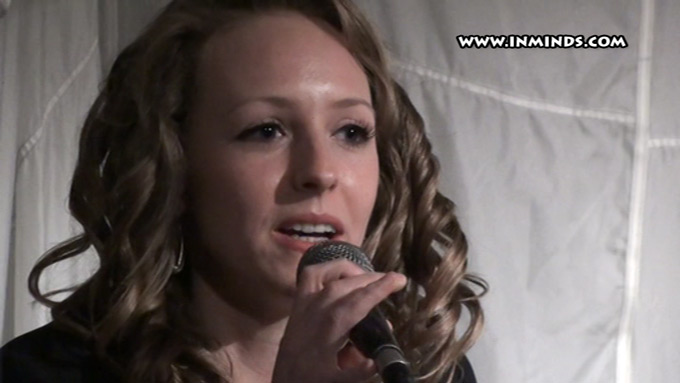 Lizzie Cocker 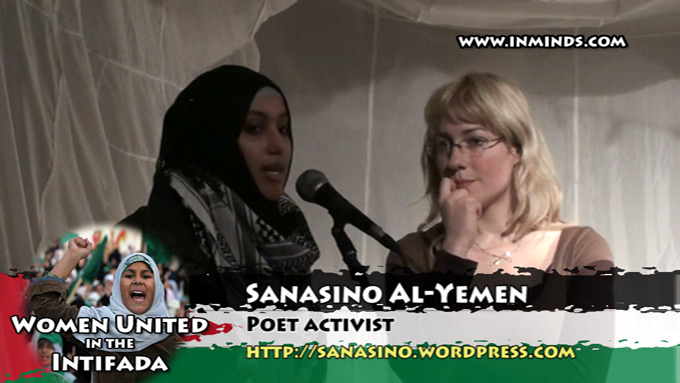 The poet activist, Sanasino, introduces Ewa Jasiewcz Ewa Jasciewcz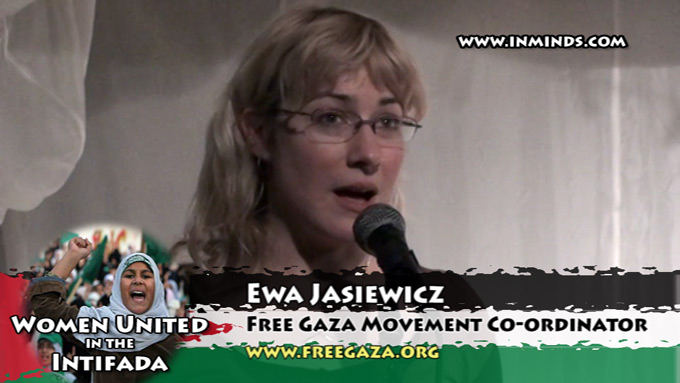 Ewa Jasciewcz Ewa Jasiewcz, activist and Free Gaza Movement co-ordinator in Gaza, spoke next on 'Women in Gaza'. Having lived in Gaza, Ewa Jasciewcz, gave a moving glimpse of life in Gaza and how women are at its centre, the bedrock which holds society together under the immense pressure of the occupation. She also questioned whether unity made sense between principalist Hamas - dedicated to resistance, and collaborationist Fatah - Israelâs occupation force with a Palestinian face: "I know the subject of this event is unity, and there is a lot of unity between people at grassroots level.. between prisoners in prison. But you can't have unity with a collaborationist force and until that changes, and maybe we are talking about different things, but for a lot of people, especially in Gaza - you know being completely cut of from the people in the West Bank for 10 years or more, its very hard for them to associate Fatah with very much apart from the Palestinian Authority and Abu Mazin - you know giving the green light for the bombing of Gaza, blocking the Goldstone Report - this was such a key tool for the Palestinian people and it comes from one of their own to try and knock this down.. the list goes on." She explained that unity comes when there are shared interests, but on the West Bank there is "a fundamental division - its like an Israeli occupation force with a Palestinian face - the ruling class, and then the rest of the people." 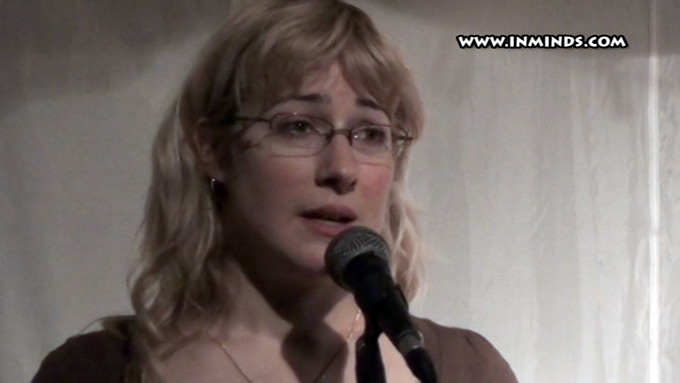 Ewa Jasciewcz Alaa Kassim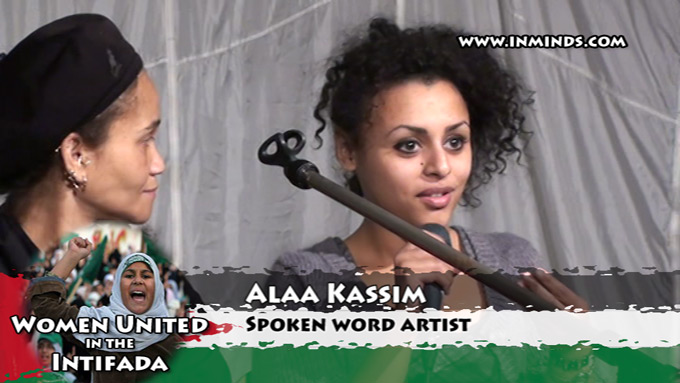 Alaa Kassim, a talented young lady giving her first public speech, spoke passionately about Leila Khaled, her life and the iconic status she achieved in the Palestinian struggle. 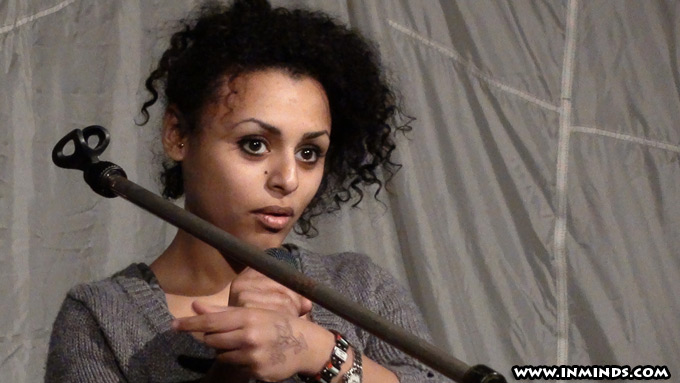 Yvonne Ridley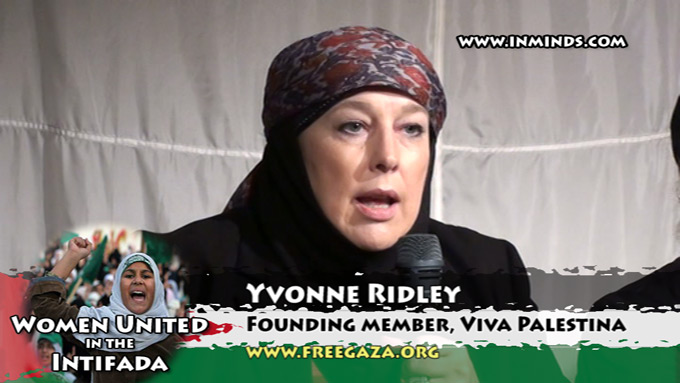 Yvonne Ridley The title of Yvonne Ridley's talk was 'Islamist Women'. She explained how due to the demonization of Islam, there is a double standard whereby Muslims are attacked for holding views that other are permitted to hold and the same double standard is applied to Hamas in Gaza: "The first time I got involved with Palestine was in the 70s when I was living in Newcastle. People think that I just really became an activist for Palestine when I embraced Islam, but it was something I got involved with.. more than 30 years ago.. and I believed then as I believe now - forget two state, forget one state, forget any state - get your hands of the Palestinian land and hand it back to the Palestinians and then admit that you have stolen it and then sit and work out a way of everybody living there together - one person one vote. That was my view more than 30 years ago, and I was allowed to have that view for many many years until I became a Muslim and put on a hijab and suddenly I became an extremist, one of those radical fundamentalist terrorist supporting people and yet I was expressing exactly the same sort of views but Islam has been so demonised over the years and it runs parallel with whats also happening in Palestine, in Gaza.." 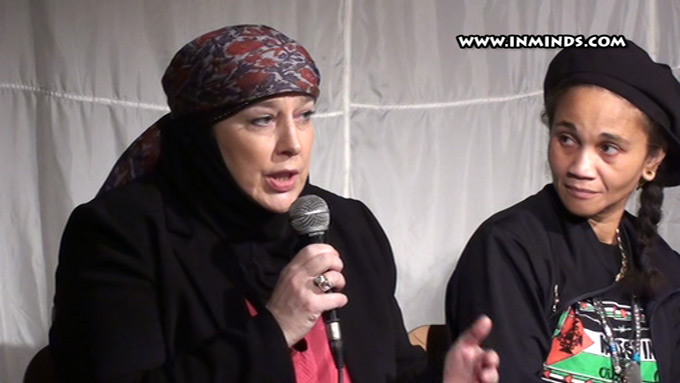 Yvonne Ridley Isis Amlak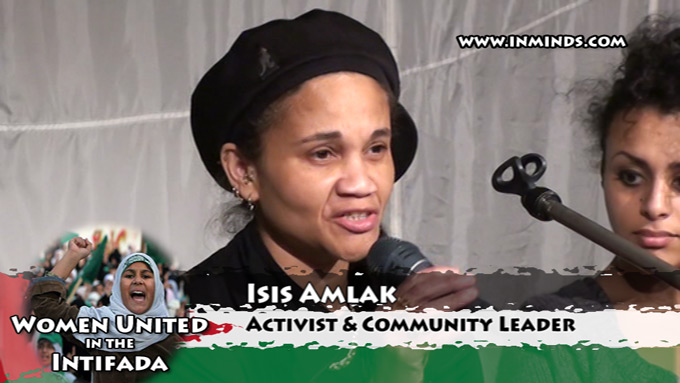 Isis Amlak Isis Amlak, activist and community leader, spoke on 'Overcoming challenges of division for internationalism and the Palestinian solidarity movement'. "For me the important thing is that if we stand against oppression, against inequality, and injustice for one groups of people, it doesn't matter who they are, its an international struggle - we use to say 'an injury to one is an injury to all' and 'a victory for one is a victory for all', for me thats really important. And I think too often we as people we look at struggles, we look at injustices purely from the point of view of who we are, who we see in the mirror. So we look at the people and we think well they look like us so we should stand with that cause, we should stand with that struggle. But the important thing is, like I said, whatâs wrong is wrong - it doesn't matter who the people are. I found something that I thought was quiet relevant, its from a book called 'Black like me', it was written by a man in the 1960s, a white man, who was travelling through the South of America during the segregationist times and he basically disguised himself as an African-American and went and experienced segregation from their point of view.. and what he says in one particular place is 'I believe that before we can truly dialogue with one another we must first perceive intellectually and then at the profoundest emotional level that there is no 'other' that the 'other' is simply oneself in all the significant essentials'." 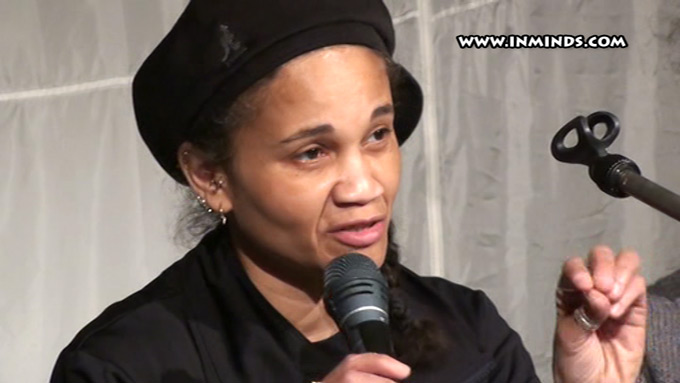 Isis Amlak Sukant Chandan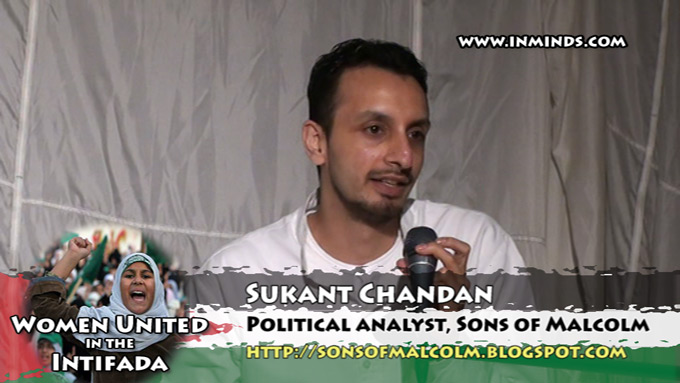 Sukant Chandan Sukant Chandan, Filmmaker and political analyst from Sons of Malcolm, spoke of 'Imperialist inspired divisions with in Palestinian politics in relation to women'. He said there "were two things I want you to take away.. I am trying to convey two main points. The first point is that we must expose, oppose and smash all plans of divide and rule by imperialist against our people anywhere in the world. The second point I want to convey very clearly this evening is that 'freedom cannot come through Caesarâs chariot' - put in another way, in a contemporary sense - freedom cannot come in a NATO intervention, freedom cannot come through Human Rights Watch or Amnesty. These are not our people.. Where I have a big problem with these western NGOs is that whenever Empire, or imperialism, or the white man, neo-colonialism, whatever you want to call it its the same thing, whenever they want a big project against any of our people then Amnesty and Human Rights Watch, they've supported that - they have laid the basis, they have laid the humanitarian imperialist ground work to conduct the attack against us." 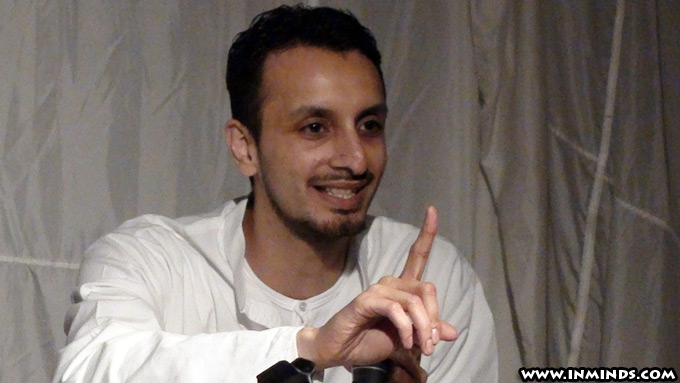 Sukant Chandan Ramzy Baroud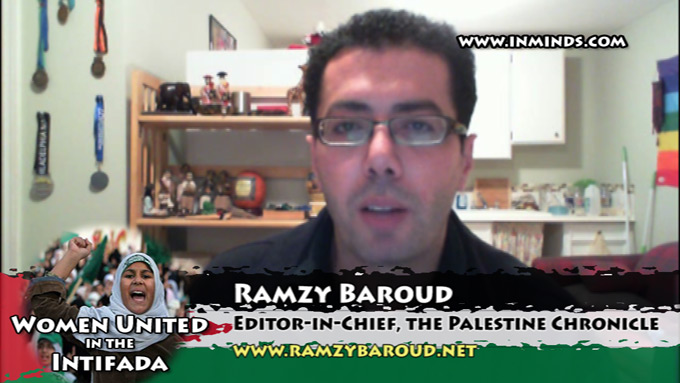 Ramzy Baroud A specially recorded talk by Ramzy Baroud, editor-in-chief of the Palestine Chronicle, on the subject of 'Women in the Intifada' was shown. Ramzy Baroud in his unique way paid homage to Palestinian women: "the silent heros.. keeping the wheel of resistance going, providing the type of support without which Palestinian society can neither survive nor can resist". By sharing personal accounts of his grandmother and mothers life he gave the audience intimate insights in to the Palestinian struggle and women central role in that struggle. His 15 minute talk was a true gem. 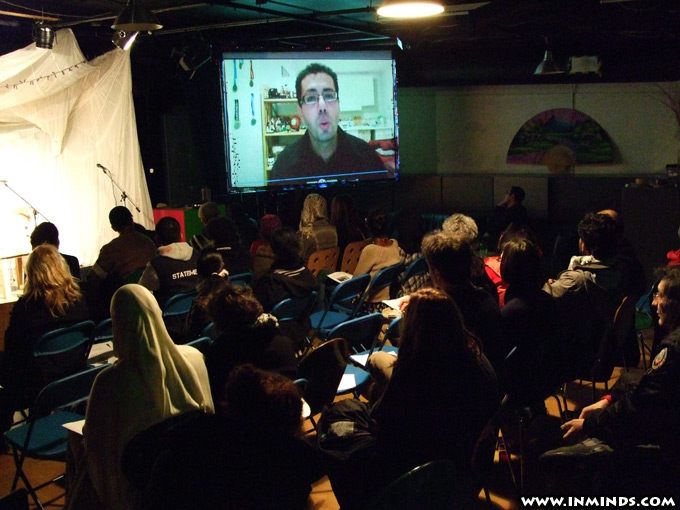 Ramzy Baroud's specially recorded 15 minute talk Question & Answer sessionThe speeches were followed by over an hour of questions and answers. Sukant Chandan's critisims of NGOs initiated perhaps one of the most interesting debates of the evening in the Question and Answer session. Lizzie Cocker mentioned Haiti after the earthquake was swamped with NGO's and studies have shown that they were detrimental to progress. Jo Berridge, one of the organisers of the event who has researched NGOs, exposed the National Endowment for Democracy 's links with the CIA. The National Endowment for Democracy was set up by an act of Congress to legally continue the Central Intelligence Agency's prohibited activities of support to pro-empire groups abroad. They have actively funded pro-imperialist groups in Nicaragua, Cuba, Venezuela and Iran. Many NGOs working in Palestine are funded by the National Endowment for Democracy are in effect working with the CIA. Yvonne Ridley spoke of personal experience of the NGOs working in Afghanistan and Sudan. In 2009 she was in Sudan when the US charity 'Thirst No More' was kicked out: "they were down there to build water wells, they had been in Sudan for three years, they hadn't built a single well. And when their offices were raided they were stacked high with Bibles!". 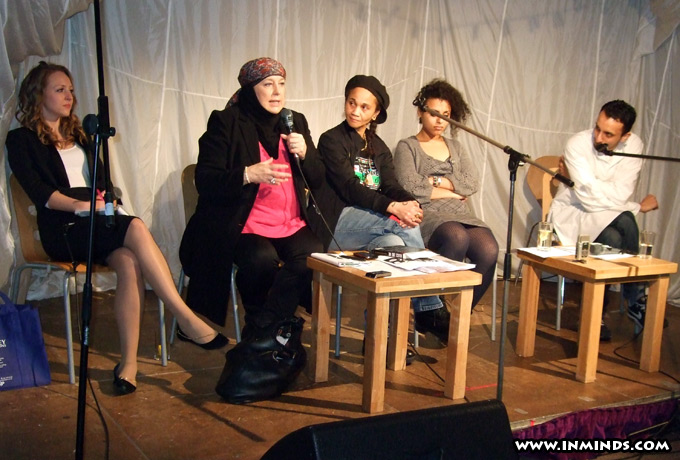 Yvonney Ridley answering a question. Video: Women United in the Intifada
Source: inminds.com Related ArticlesAlso Of InterestPage URL: http://www.inminds.co.uk/article.php?id=10508
|
|
Support Us
If you agree with our work then please support us.Campaigns INMINDS Facebook Live Feed Latest Video's
INMINDS Twitter Feed Tweets by @InmindsComFeatured Video's
You need Flash player 8+ and JavaScript enabled to view this video.
[all videos (over 200)..] Featured MP3 Podcast 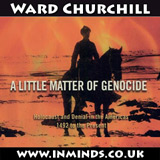 "1763 in the Ohio river valley you got Lord Jeffrey Amherst committing to written order an instruction to his subordinate Henry Bouquet, having been defeated by Pontiac Ottawa confederacy in the field. The order essentially says that they have been defeated militarily and is therefore necessary for Amherst forces to request a peace, to sue for peace from Pontiacs people. He instructs Bouquet to convene a parlay with the Indian leadership for that purpose. And as is the custom, as is common courtesy among native populations as was known to the Brits at that time, it would be necessary for those who requested the council to give gifts to those requested to attend. Make those gifts, Amherst says, items taken from a smallpox infirmary in order, I'm going to quote directly now, this isn't a paraphrase: 'in order that we may extirpate this execrable race'. Now key is on this last word, had he said that we might eradicate the opposing combatants, their military capacity, their warriors.. what ever term he wanted to use, it would have been biological warefare. But he didn't say anything about that, he said the 'race'. His intent was to use biological means, to use disease, quite explicitly so, to eradicate an entire population group. And Bouquet was also kind enough to commit to writing in his response the next day, I have done as instructed, dispersing three blankets, two handkerchiefs and sundry other items, hopefully, he says, they will have the desired result. They did.. the lowest estimate of the number of people who died of smallpox as a result of that little gesture of friendship and goodwill is a 100,000!" American Indian scholar, activist in the struggle for liberation of Indigenous Peoples in America On the publication of the book 'A Little Matter of Genocide: Holocaust and Denial in the Americas, 1492 to the Present', 1997 [29min / 10Mb] [all podcasts..] Newsletter Feedback |
 |
 |






















